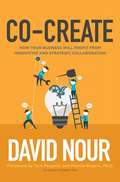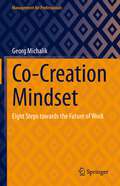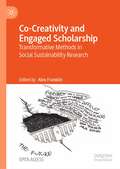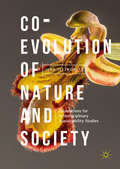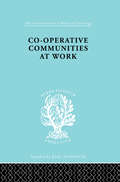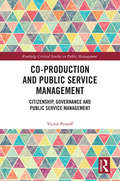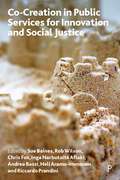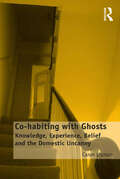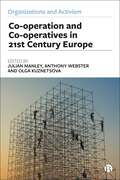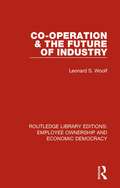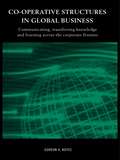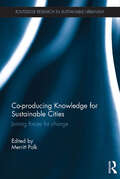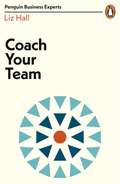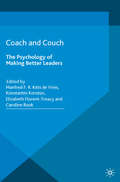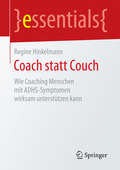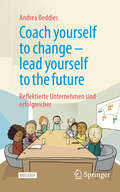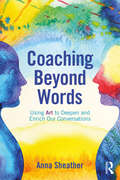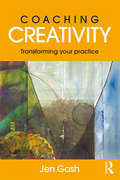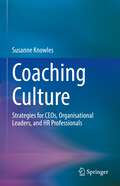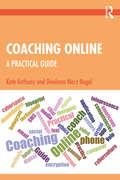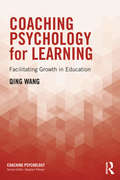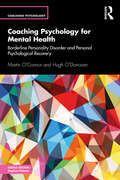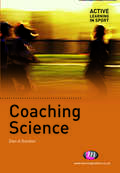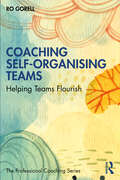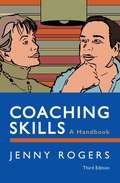- Table View
- List View
Co-Create: How Your Business Will Profit from Innovative and Strategic Collaboration
by David NourWhat if your customers had a vested interest in guiding your company toward greater success? What if your employees had a personal as well as professional commitment to elevating your organization? Imagine how different your results would be if investors, vendors, and even analysts treasured the relationship they have built with you?Most important . . . is your company capable of setting aside a bit of its own self-interest to become part of dramatically more rewarding collaborative effort? That’s the provocative and ultimately earthshaking question David Nour poses. He argues that co-creation is a transformational journey that naturally leads to growth and evolution . . . because it gives birth to shared interests that dwarf anything that existed previously.In Co-Create, David Nour makes the case that co-creation leads to Market Gravity™, a force that attracts stakeholders to your business because they recognize that many others have also united their interests with yours. It’s the sense—backed by tangible metrics—that this is bigger than any of us imagined . . . except that you imagined precisely such an outcome. That’s the power of co-creation.
Co-Creation Mindset: Eight Steps towards the Future of Work (Management for Professionals)
by Georg MichalikCo-creation is a major trend in management, yet no one seems to truly know what it is. With numerous examples and a Q&A section, this book explains exactly what co-creation is and how it differs from other forms of collaboration. To do so, it covers three main topics: innovation, trust and commitment. With regard to the first, co-creation creates a sense of psychological security by treating all participants as equals, the most important prerequisite for finding innovative solutions. In terms of trust, co-creation builds on individual strengths. People who believe in each other’s abilities trust each other. Lastly, co-creation allows people to arrive at win-win solutions, which is the foundation for taking personal ownership.The book is intended for executives, HR and organizational managers, and those responsible for corporate transformation who want to implement co-creation in a very concrete way, as well as anyone interested in co-creation in general.
Co-Creativity and Engaged Scholarship: Transformative Methods in Social Sustainability Research
by Alex FranklinThis open access book explores creative and collaborative forms of research praxis within the social sustainability sciences. The term co-creativity is used in reference to both individual methods and overarching research approaches. Supported by a series of in-depth examples, the edited collection critically reviews the potential of co-creative research praxis to nurture just and transformative processes of change. Included amongst the individual chapters are first-hand accounts of such as: militant research strategies and guerrilla narrative, decolonial participative approaches, appreciative inquiry and care-ethics, deep-mapping, photo-voice, community-arts, digital participatory mapping, creative workshops and living labs. The collection considers how, through socially inclusive forms of action and reflection, such co-creative methods can be used to stimulate alternative understandings of why and how things are, and how they could be. It provides illustrations of (and problematizes) the use of co-creative methods as overtly disruptive interventions in their own right, and as a means of enriching the transformative potential of transdisciplinary and more traditional forms of social science research inquiry. The positionality of the researcher, together with the emotional and embodied dimensions of engaged scholarship, are threads which run throughout the book. So too does the question of how to communicate sustainability science research in a meaningful way.
Co-Evolution of Nature and Society: Foundations for Interdisciplinary Sustainability Studies
by Jens JetzkowitzThis book offers support for interdisciplinary research on the interactions of nature and society. It is based on the hypothesis that a science of coevolution is needed to explore paths to a sustainable future. Jens Jetzkowitz initially discusses why social science knowledge only rarely finds its way into sustainability discourse. One significant issue is a view of science that separates knowing and acting, and the book illustrates current problems in conceptualising interdisciplinary knowledge production. It then goes one step further and introduces a workable alternative concept, taking philosophical pragmatism as a point of departure. Sustainable development goals and transdisciplinarity are currently subject to widespread discussions and Jetzkowitz takes a stance on the debates from the perspective of coevolutionary science.This book will appeal to scholars and students interested in environmental and sustainability discourses and to anyone willing to think outside the box.
Co-Operative Communities at Work (International Library of Sociology)
by Henrik F. InfieldThis is Volume IV in a series of twenty-two on Race, Class and Social Structure. Originally published in 1947, in this study is an attempt to sum up the lessons offered by co-operative communities of the past and present. The work deals with two principal tasks: (I) a description of the most significant instances of co-operative living in relation to post-war planning; (2) their application to resettlement to-day.
Co-Production and Public Service Management: Citizenship, Governance and Public Services Management (Routledge Critical Studies in Public Management)
by Victor PestoffThis volume compiles a dozen essays, by one of the most prolific proponents of co-production as a solution for many of the challenges facing public services and democratic governance at the outset of the 21st Century. Co-production is considered a partnership between citizens and public service providers that is essential for meeting a growing number of social challenges, since neither the government nor citizens can solve them on their own. These challenges include, among other things, improving the efficiency and effectiveness of public services in times of financial strain; increasing the legitimacy of the public sector after decades of questioning its ability with the spread of New Public Management; promoting social integration and cultural pluralism in increasingly diverse societies when millions of refugees and immigrants are on the move; tackling the threat of burgeoning populism following the rise of anti-immigrant and anti-global parties in many countries in recent years; and finally, finding viable solutions for meeting the growing needs of aging populations in many parts of the world. This volume addresses issues related to the successful development and implementation of a policy shift toward greater citizen participation in the design and delivery of the services they depend on in their daily lives and greater citizen involvement in resolving these tenacious problems, facilitated by the active support of governments across the globe. Moreover, it explores participatory public service management that empowers the front-line staff providing public services. Together with users/citizens they can insure the democratic governance of public service provision.
Co-creation in Public Services for Innovation and Social Justice: Concrete Elasticity!
by Sue Baines, Rob Wilson, Chris Fox, Inga Narbutaité Aflaki, Andrea Bassi, Heli Aramo-Immonen and Riccardo PrandiniAvailable Open Access digitally under CC-BY-NC-ND licence. This book examines the idea and practice of co-creation in public services. Informed by practical action, lived experience and research from 10 countries across Europe, including the UK, it shines new light on the theory and reality of co-creation by conceptualising it in terms of human rights, social justice and social innovation. Focusing on human dimensions, the book presents real life examples in public services as diverse as social care, health, work activation, housing and criminal justice. It also highlights the ways digital technologies can accelerate or hinder co-creation. The book confronts a paradox at the heart of co-creation: standardisation and inflexibility in planning and resourcing, or ‘concrete-ness’, counters the ‘elasticity’ required to sustain co-creation in complex contexts.
Co-habiting with Ghosts: Knowledge, Experience, Belief and the Domestic Uncanny
by Caron LipmanHow does it feel to live in a ’haunted home’? How do people negotiate their everyday lives with the experience of uncanny, anomalous or strange events within the domestic interior? What do such experiences reveal of the intersection between the material, immaterial and temporal within the home? How do people interpret, share and narrate experiences which are uncertain and unpredictable? What does this reveal about contested beliefs and different forms of knowledge? And about how people ’co-habit’ with ghosts, a distinctive self - other relationship within such close quarters? This book sets out to explore these questions. It applies a non-reductive middle-ground approach which steers beyond an uncritical exploration of supernatural experiences without explaining them away by recourse only to wider social and cultural contexts. The book attends to the ways in which households in England and Wales understand their experience of haunting in relation to ideas of subjectivity, gender, materiality, memory, knowledge and belief. It explores home as a place both dynamic and differentiated, illuminating the complexity of ’everyday’ experience - the familiarity of the strange as well as the strangeness of the familiar - and the ways in which home continues to be configured as a distinctive space.
Co-operation and Co-operatives in 21st-Century Europe
by Julian Manley, Anthony Webster and Olga KuznetsovaThis volume explores where, how and why the cooperative model is having a distinctive, transformational impact in driving socio-economic changes in a post-pandemic 21st century world. Drawing from a diverse range of examples, the book sheds light on how today’s cooperatives and a co-operative way of organising might serve new societal demands. It examines organisational structures and governance models that develop socio-economic resilience in cooperatives. The book’s contributors reveal how the very pursuit of cooperative values and principles challenges market fundamentalism and promotes participatory democracy. This is a timely contribution to recent debates around transformative economies and an invaluable resource for scholars and activists interested in alternative ways of organising.
Co-operation and the Future of Industry (Routledge Library Editions: Employee Ownership and Economic Democracy #16)
by Leonard S. WoolfIn this book, originally published in 1918, the Leonard S. Woolf explores the development of the Co-operative Movement into a democratic industrial system. This title combines a description of the movement as it was, with a picture of the ways in which the author felt it would become if it followed out and developed its principles and ideals. This title will be of interest to students of economic history and employee ownership.
Co-operative Structures in Global Business: Communicating, Transferring Knowledge and Learning across the Corporate Frontier (Routledge International Studies in Business History #No.9)
by Gordon H. BoyceUsing a series of twelve historical case-studies that are based on extensive archival research, this book explains why firms succeed or fail in communicating or transferring knowledge and discovering new expertise. By analysing how workable trade-offs between opposing forces have been achieved in the past, this study provides a set of guidelines for executives who embark upon inter-firm projects.
Co-producing Knowledge for Sustainable Cities: Joining Forces for Change (Routledge Research in Sustainable Urbanism)
by Merritt PolkAt the current time, many issues and problems within sustainable urban development are managed within traditional disciplinary and organizational structures. However, problems such as, climate change, resource constraints, poverty and social tensions all exceed current compartmentalization of policy-making, administration and knowledge production. This book provides a better understanding of how researchers and practitioners together can co-produce knowledge to better contribute to solving the complex challenges of reaching sustainable urban futures. It is written for academic and professional audiences working with urban planning and sustainable cities around the world. Co-producing Knowledge is presented, by way of introduction, as a non-linear, collaborative approach to knowledge production which combines interdisciplinary, transdisciplinary, cross sector and policy approaches to societal problem solving. Examples are taken from Cape Town, Gothenburg, Kisumu, Manchester, Melbourne and a selection of cities in Southeast Asia. Each city chapter discusses the drivers and motivations behind knowledge co-production and gives concrete examples of activities and approaches that have been used to promote sustainable urban futures. Each chapter is written to promote mutual learning from the approaches that are already in use. Building upon these city cases, the conclusions outline an international practice and research agenda aimed at strengthening the promotion and implementation of the knowledge co-production for sustainability across diverse urban development contexts. This book provides an overview of the diverse driving forces behind co-production, and their specific contexts and constraints in a variety of cosmopolitan urban contexts. Some of these include institutional and cross-sector barriers to co-production, the need for learning across diverse levels and contexts, and strategies for balancing scientific excellence with the needs of societal change. This book offers valuable lessons regarding the concrete implications and potential impact that co-production processes can have for different user groups, such as planners, politicians, researchers, business interests and NGOs in different urban development contexts.
Coach Your Team (Penguin Business Experts Series)
by Liz HallIt has never been a more challenging time for managers and leaders to maintain a happy, healthy workforce. The pace of change and increasing uncertainty in most industries has resulted in a rapid increase in stress and anxiety in the workplace, and most organizations are poorly equipped to respond to these challenges in a meaningful and supportive way.Penguin Business Experts: Coach Your Team is a practical guide for leaders who want to foster a culture where everyone has a chance to flourish, create and innovate while being happy and more resilient. It draws on cutting-edge evidence-based techniques in coaching that focus on developing mindfulness and compassion in leaders, their employees and throughout their organisation with case studies of best practice from around the world. It covers everything you need to know to develop your own approach to coaching starting with learning how to coach yourself through to techniques to foster a coaching culture rooted in mindfulness and compassion within your team, and ultimately your organisation.
Coach and Couch 2nd edition: The Psychology of Making Better Leaders (INSEAD Business Press)
by Elizabeth Florent-Treacy Manfred F.R. Kets de Vries Konstantin Korotov Caroline RookProfessor Manfred Kets de Vries and his colleagues have helped thousands of executives to increase their effectiveness in dealing with colleagues and clients, and to refocus their own professional and personal aspirations. This book is a volume of essays on leadership development topics written by academics, coaches, and change consultants. It explores how extraordinary leaders and thriving organizations are created by sharing research methodologies and insights, and by describing intervention and change techniques. Drawing upon substantial research, this book presents the essential leadership models and equips practitioners with tools for developing executive coaches and working with business leaders. This second edition includes new chapters on executive stress and coaching across the gender divide.
Coach statt Couch: Wie Coaching Menschen mit ADHS-Symptomen wirksam unterstützen kann (essentials)
by Regine HinkelmannRegine Hinkelmann stellt ein ADHS-Coaching-Konzept vor, das dazu beitragen soll, Adulte mit ADHS-Symptomen in ihrem lebens- und arbeitsweltlichen Umfeld zu unterst#65533;tzen und zu st#65533;rken. Dazu legt sie einen an der ADHS-Symptomatik orientierten sechsphasigen Prozessverlauf sowie symptomspezifische Interventionen zur Bearbeitung der Kardinalsymptome dar und ordnet diese anhand einer Beschreibung der relevanten Beraterkompetenzen in einen Gesamtkontext ein. Obwohl es sich bei der Aufmerksamkeitsdefizit- und Hyperaktivit#65533;tsst#65533;rung (ADHS) um eine Symptomatik handelt, die mittlerweile einer breiten #65533;ffentlichkeit bekannt ist, konnten klassische medikament#65533;se und psychotherapeutische Behandlungsformen das verst#65533;rkte Auftreten von ADHS nicht verhindern. Insbesondere im Bereich der Arbeitswelt sehen sich die Betroffenen gro#65533;en Herausforderungen und Schwierigkeiten ausgesetzt.
Coach yourself to change – lead yourself to the future: Reflektierte Unternehmen sind erfolgreicher
by Andrea BeddiesChange ist in aller Munde, Transformation aktuell umso mehr. Und häufig wird beklagt, dass keine*r sich verändern will. Wenn überhaupt, soll es lieber „die anderen“ treffen. Wo kommt dieses Vorurteil her? Coach yourself to change eröffnet, basierend auf der Arbeitspsychologie, einen strategischen Blick auf individuelle Veränderung und auf die Veränderung der gesamten Organisation und vor allem darauf, wann und warum sie vorangetrieben wird und gelingt und wann und warum eben nicht.
Coaching Beyond Words: Using Art to Deepen and Enrich Our Conversations
by Anna SheatherIn Coaching Beyond Words: Using Art to Deepen and Enrich Our Conversations, Anna Sheather presents a practical guide for those seeking to incorporate art in their own coaching practice. Complete with case studies and art created by clients, Anna explores how coaching with art connects clients to a deeper level of personal awareness and understanding, which in turn leads to meaningful shifts in personal growth, development and fulfilment. Anna offers the coach an exciting and transformative way to work with their clients by bridging the gap between art and coaching. She covers how to introduce creative approaches, how to support creativity and how to work with the art produced, opening enriching coaching conversations with clients. Anna combines her personal experiences with research that underpins her practice, exploring the benefits of the interdisciplinary nature of art therapy and neuroscience by looking at the field of hemispherical lateralisation to help understand why coaching with art works so effectively. The book also provides a comprehensive guide of how to prepare an art-based coaching session, including contracting, an overview of types of exercises, key principles and approaches to facilitating the image making process, overcoming barriers with coachees and guidance on managing oneself in the process, including managing boundaries. Coaching Beyond Words is the first book to provide an in-depth look at the importance and practicality in interweaving coaching and art, and it forms a complete guide to context, theory and practice.Coaching Beyond Words will appeal to coaches in practice as well as any art therapist seeking to expand their practice into coaching. Additionally, it would be of interest to creative professionals looking to incorporate coaching theory.
Coaching Creativity: Transforming your practice
by Jen GashCreativity and coaching are two of the buzzwords of the twenty-first century and yet little is known about how to coach creativity. In business, education, health and many other fields there is an increasing acknowledgement of the importance of innovation and recognition of what is lost when creativity is lacking. In Coaching Creativity, Jen Gash explores the history, science and practice of "creativity" by artists, makers and creators, translating this into practical advice for coaches. The book investigates the concept of creativity and examines the theories surrounding it from psychological, neurological and biological perspectives. It then takes a more practical look at the "doing" of creativity and explores the use of creativity in therapeutic settings. A model of coaching creativity is presented which acknowledges its diverse and individual nature. The book also includes are tools, case studies and ideas for coaching creativity including contributions from a wide range of coaches. Coaching Creativity will be inspiring reading for coaches of all backgrounds, including business and organisational coaches, those in training, and others in the helping professions looking to enhance their practice. It is essential reading for all coaches who aim to support clients’ creative goals and use creativity in their own practice. It fills important gaps in current coach education and practice.
Coaching Culture: Strategies for CEOs, Organisational Leaders, and HR Professionals
by Susanne KnowlesThis book reports on an empirically-based, theoretical model of coaching culture development over four stages. This is the first model of coaching culture development that goes beyond the listing of stages and strategies in the academic literature based on pracademic experience. It is a dynamic, process model which informs practitioners of how to develop a coaching culture in organisations. Each stage is explained in terms of how coaching is conceptualised by organisational leaders, the motivation for introducing coaching into the organisation, the organisational members who are the recipients of coaching, and those who are involved in delivering the coaching at each stage. The model contributes to the academic literature and the growing calls for coaching to become a discipline in its own right.
Coaching Online: A Practical Guide
by Kate Anthony DeeAnna Merz NagelTranslating traditional coaching methods and competencies for use in the online world, this informative and timely guide shows coaches how to transform their face-to-face practice into one that utilises technological means of communication with clients, mentors, and everyone else associated with their practice. The book offers up-to-the-minute practical and ethical information from two world-expert coaches, leaning on their combined 50 years of experience and study. It covers the practice of online coaching via email, chat, audio/telephone and video methods, as well as the ethics of online coaching (including an ethical framework), case material, supervision, mentoring and training, and a look into the future of the coaching profession in light of technological developments and the culture of cyberspace. Whether you are a coach-in-training or established Coaching Master, this book is an accessible and invaluable tool for taking and maintaining your coaching services online.
Coaching Psychology for Learning: Facilitating Growth in Education (Coaching Psychology)
by Qing WangThe contribution of coaching psychology to educational fields is increasingly recognised. This timely book introduces coaching psychology as a facilitative method to support learning in different educational contexts.Coaching Psychology for Learning: Facilitating Growth in Education is conveniently organised into three parts: Part One begins with a detailed account of educational paradigms, learning theories, and coaching psychology theories; it then reviews important studies of coaching applied to the educational field and identifies a number of gaps to which coaching psychology for learning can contribute; Part Two presents two empirical participatory studies of coaching psychology for learning, which draw from both doctoral research conducted in the UK and educational work in Mainland China; two original and evidence-based coaching models are also illustrated; Part Three consolidates the empirical evidence and original coaching models by exploring the nature of educational coaching, including the context, purpose, processes, and people and their interrelations. The review of learning theories and coaching psychology theories in Part One enables the reader to gain a quick understanding of coaching psychology and its role in education, while the empirical studies in Part Two are particularly useful for undergraduate and postgraduate students, providing practical examples of how to conduct coaching psychology research in the field of education, in both the West and the East. The book also offers advice on design and implementation issues, which will benefit educational psychologists and coaching psychologists who wish to focus their professional practice in education.Coaching Psychology for Learning is essential reading for any teacher, student or practitioner who wishes to become an educational coach to facilitate learning. It will appeal to coaches and coaching psychologists, including those in training and at postgraduate level, as well as professionals in educational settings, such as school leaders, counsellors and coaches, and educational psychologists.
Coaching Psychology for Mental Health: Borderline Personality Disorder and Personal Psychological Recovery (Coaching Psychology)
by Hugh O'Donovan Martin O'ConnorTraditionally, coaching psychologists have worked with people who aren’t experiencing significant mental distress or have diagnosed mental illness. This book describes an innovative and challenging project of bringing coaching psychology to the lived experience of individuals with a diagnosed mental illness, Borderline Personality Disorder (BPD). The authors present a case for why coaching psychology needs to be constructively challenged to broaden its base and be more inclusive and of service to people experiencing BPD in particular. The book describes a coaching interaction involving coaching psychologists and a number of individuals with BPD who had completed a behavioural skills programme (Dialectical Behaviour Therapy; DBT). It explores the epistemological and practice tensions involving the dominance of clinical recovery (elimination of symptoms) in mental health services and personal or psychological recovery (originating in the narratives of people with a diagnosis of mental illness who yearn to live a life worth living). This book, written amidst the Covid-19 pandemic, makes a compelling case for coaching psychologists to engage with the philosophy and practice implications of personal recovery, at both professional and personal levels. It will be vital reading for those engaged in coaching psychology and for the education, training and continuous professional development of coaches and coaching psychologists.
Coaching Science (Active Learning in Sport Series)
by Dan GordonCoaching is an increasingly important area of sports science courses, and this text provides accessible and up-to-date coverage of this key topic. Modern coaches need to be applied scientists who keep abreast of research and are able to apply a multidisciplinary understanding to their practice. The book therefore examines coaching in terms of biomechanics, physiology and psychology, as well as perennial issues such as athlete motivation, nutrition, design of training programmes, talent identification, monitoring and ethics. Written by an author who combines academic expertise with high-level practical experience, the book successfully links theory with case studies.
Coaching Self-Organising Teams: Helping Teams Flourish
by Ro GorellThere is a tendency to assume that teams will naturally know how to self-organise and optimise their collective talents. This thoughtful and engaging book explores the practicalities of coaching teams and some of the challenges that naturally occur because of who we are as human beings. Part of The Professional Coaching Series, this book challenges the assumption that self-organising teams will work in all settings, answering some of the recurring questions and challenges observed in many organisations. How do we connect with each other, so we create trust? How do we work through conflict and see it as part of a natural ebb and flow in relationships? How do we create meaningful work in the context of an ever-changing environment? The opening chapter lays out some basic team coaching principles to help set the stage for coaching people in teams and there are coaching questions in each chapter to engage the reader, as well as tools they can use immediately. Coaching teams is more than just applying coaching skills. It requires a deep understanding of how people behave and an adaptive approach to coaching. This book provides both research references and practical tools to help team coaches start their team coaching journey.
Coaching Skills: A Handbook (Third Edition)
by Jenny Rogers<p>Coaching Skills is a popular text for coach training schools all over the world, brought to life with dozens of case studies and practical guidance, while also emphasizing the importance of underpinning psychological awareness and understanding. <p>This book will support you whether you are an experienced coach working with senior executives, or a beginner taking your first steps on the journey to becoming a master-practitioner. <p>Now includes new material on: coaching and the human brain, working with clients on their self-limiting beliefs, new models of understanding what coaching is and being a coach during the psychological stresses of a severe economic recession.
